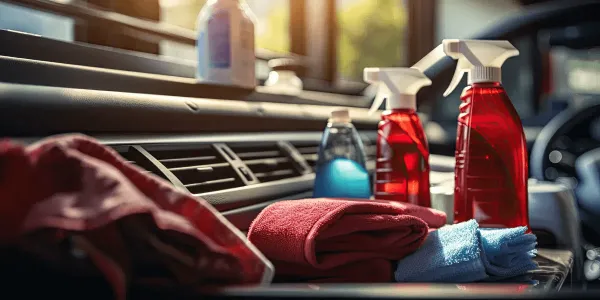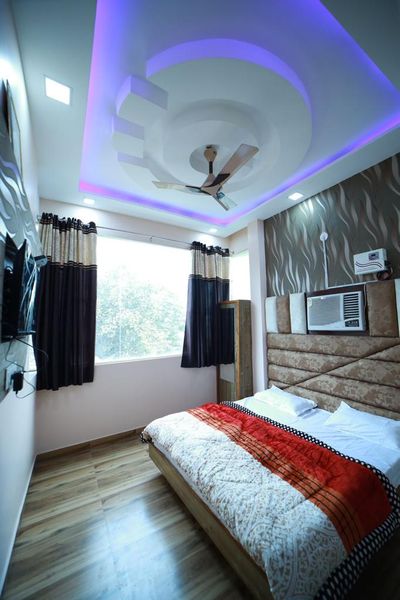Understanding Private Label Auto Detailing Chemical Manufacturing
 Rose Cartel
16 Aug, 2025
11 mins read
35
Rose Cartel
16 Aug, 2025
11 mins read
35

The automotive detailing industry has experienced steady growth over the years, with increasing consumer demand for vehicle maintenance, restoration, and preservation. At the heart of this growth is the chemical segment, which includes a wide range of products like shampoos, degreasers, waxes, ceramic coatings, tire dressings, and interior cleaners. For many entrepreneurs and businesses, entering the detailing market through private label manufacturing has become a strategic option.
What Is Private Label Manufacturing?
Private label manufacturing is when a manufacturer produces goods that are sold under another company's brand. In the case of auto detailing chemicals, private label manufacturers formulate and produce car care products, then package them with the branding and labeling provided by the client.
Unlike white labeling, where the same generic product is sold by different brands, private labeling often allows for customized formulations, fragrances, packaging, and even exclusive product lines. This gives brands the opportunity to differentiate themselves in a competitive market.
The Range of Auto Detailing Chemicals Available
Private label manufacturers typically offer a comprehensive catalog of car care products, including but not limited to:
- Car Wash Soaps/Shampoos – pH balanced, foaming formulas designed to safely remove dirt.
- Wheel and Tire Cleaners – Formulated to break down brake dust and road grime.
- Glass Cleaners – Streak-free, ammonia-free options for interior and exterior glass.
- Interior Cleaners and Conditioners – Designed for plastics, leather, vinyl, and upholstery.
- Degreasers and All-Purpose Cleaners (APCs) – Versatile for engine bays, door jambs, and more.
- Paint Sealants and Waxes – Synthetic or natural protection for painted surfaces.
- Ceramic Coatings – Long-lasting SiO₂-based protection for paint and trim.
- Quick Detailers and Spray Sealants – For touch-ups and added gloss between washes.
These products can be offered in various concentrations (RTU or dilutable), fragrances, and container sizes (from 4 oz bottles to 55-gallon drums or IBC totes).
Benefits of Private Labeling in the Auto Detailing Industry
- Lower Barriers to Entry
- Private labeling eliminates the need for expensive R&D, production facilities, and regulatory compliance infrastructure. This makes it easier for startups and existing businesses to enter the market with minimal upfront investment.
- Customization and Flexibility
- Many manufacturers offer formulation customization. Whether it’s tweaking pH levels, viscosity, fragrance, or color, this flexibility helps businesses cater to specific customer preferences or niche markets.
- Brand Ownership and Control
- Clients own the branding, packaging design, and marketing strategy. This gives them more control over how their products are positioned and perceived in the market.
- Focus on Sales and Marketing
- Without needing to manage production, businesses can concentrate on branding, customer service, and distribution—core areas that drive growth.
- Scalability
- As the brand grows, production can easily be scaled up through the manufacturer without significant additional investment from the brand owner.
The Manufacturing Process: From Concept to Delivery
Here’s how the private label process typically unfolds:
1. Consultation and Product Selection
The process starts with a discussion about the client’s needs, target market, and desired product types. The manufacturer may present a catalog of existing formulations or offer to develop new ones.
2. Formulation and Sampling
Clients can request samples of standard or custom formulations to evaluate performance, scent, consistency, and packaging compatibility. Some manufacturers may charge for custom formulation or sampling.
3. Packaging and Labeling
The next step involves selecting appropriate packaging options—bottles, sprayers, caps, and labels. Clients may use their own design or collaborate with the manufacturer’s design team to create compliant and attractive labels.
4. Compliance and Safety Documentation
Reputable manufacturers provide SDS (Safety Data Sheets), technical data sheets, and ensure that formulations comply with local regulations (such as VOC limits in California). This step is crucial for legal compliance and consumer safety.
5. Production and Quality Control
Once everything is approved, the manufacturer begins production. Most manufacturers implement strict quality control measures to ensure batch consistency and product performance.
6. Packaging and Fulfillment
Products are filled, labeled, and packed for shipping. Depending on the agreement, the manufacturer may ship directly to the client’s warehouse, retail locations, or even dropship to end customers.
Key Considerations When Choosing a Private Label Manufacturer
- Experience and Reputation
- Look for manufacturers with proven experience in the detailing industry. A good track record ensures better reliability and quality.
- Regulatory Knowledge
- The manufacturer should be well-versed in industry regulations, including environmental and safety standards.
- Minimum Order Quantities (MOQs)
- MOQ requirements can vary widely. Some companies cater to small startups, while others focus on bulk clients.
- Customization Capabilities
- Assess whether the manufacturer can support your specific needs, including fragrance options, colors, bottle types, and label design.
- Lead Times and Logistics
- Understand their production and delivery timelines, especially if you operate in a time-sensitive retail environment.
- Support and Communication
- A responsive and communicative partner is essential for a smooth private label experience, especially when handling multiple SKUs or custom orders.
Market Trends in Detailing Chemicals
- Eco-Friendly Formulations: More manufacturers are offering biodegradable, low-VOC, and non-toxic products in response to consumer demand and environmental regulations.
- Ceramic and Graphene-Based Products: Advanced coatings continue to grow in popularity due to their durability and high-gloss finish.
- Waterless and Rinseless Solutions: These are becoming more prominent, particularly in regions with water restrictions or mobile detailing services.
- Concentrated Products: To reduce shipping costs and environmental impact, many brands offer dilutable concentrates that allow customers to mix their own solutions.
Conclusion
Private label manufacturing has become an essential avenue for businesses looking to enter or expand within the auto detailing industry. It offers a cost-effective and scalable way to offer high-quality car care products without the burden of manufacturing. Whether you’re a small detail shop looking to establish a house brand or an entrepreneur launching an e-commerce line, private labeling provides flexibility, speed-to-market, and the ability to focus on building your brand. However, choosing the right manufacturing partner and understanding the process thoroughly are key to long-term success in this competitive market.
Written By:
Rose Cartel



Hotels at your convenience
Now choose your stay according to your preference. From finding a place for your dream destination or a mere weekend getaway to business accommodations or brief stay, we have got you covered. Explore hotels as per your mood.





